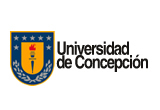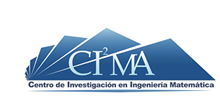Graduate Thesis of Bryan Gómez
 | Program | PhD in Applied Sciences with mention in Mathematical Engineering, Universidad de Concepción |
|---|---|---|
| Enrollment Year | 2016 | |
| Senior Year | 2019 | |
| Thesis Title | Mixed Finite Element Methods for Coupled Diffusion Problems in Mechanics | |
Thesis Summary:The aim of this thesis is to develop new mixed finite element methods for generating approximate solutions to problems governed by coupled systems of partial differential equations arising in the modelling of fluid and solid mechanics. In particular, we focus on two models: stress-assisted diffusion and a phase change framework. Due to the scarce information concerning mathematical and numerical analysis for these specific models, in this thesis we propose to establish well-posed finite element approaches in order to obtain existence and uniqueness of the solution. Thus, for the mathematical and numerical analysis, we introduce primal and mixed schemes, and then, by using classical techniques and results, we prove the solvability of the continuous and discrete problems, and establish the corresponding error estimates. In turn, for all problems mentioned above, numerical experiments validate the theory. Moreover, several tests illustrate the applicability of these schemes, including the simulation of microscopic electrode damage in lithium ion batteries, phase change in a cuboid cavity, and melting of solid materials. We begin with the mathematical and numerical analysis of a coupled elasticity-diffusion system modeling the transport phenomena and chemical interactions within a solid. The coupling is introduced with a so-called stress-enhanced diffusion framework, where the propagation of the species is affected by stresses generated by solid motion. The system is fomulated in terms of stress, displacement and rotation for the elasticity equations, whereas concentration is used for the diffusion problem. For the mathematical analysis, two variational formulations are proposed, namely mixed-primal and augmented mixed-primal approaches. The solvability of the resulting coupled formulations is established by combining fixed-point arguments, regularity estimates, Babuška-Brezzi theory and the Lax-Milgram lemma. We then construct corresponding Galerkin discretisations based on adequate finite element spaces, and derive optimal a priori error estimates. Next, we analyse the model presented above, but we do so based on a fully-mixed formulation. Based on regularity considerations, an augmented mixed formulation for the diffusion problem is proposed, whereas the classical stress-displacement-rotation mixed formulation is used for the elasticity equations. The resulting Galerkin scheme yields an augmented fully-mixed finite element method employing Arnold-Falk-Winther elements for elasticity, and a Raviart-Thomas in conjunction with a piecewise polynomial triplet for the mixed-diffusion equations. The well-known Schauder and Brouwer fixed point theorems are utilised to establish the existence of solutions of the continuous and discrete formulations, respectively. Then, sufficiently small data allow us to prove uniqueness of solution and to derive optimal a priori error estimates. In addition, a posteriori error analysis and adaptive computations in two dimensions are further carried out for the aforementioned mixed-primal and fully mixed approaches. For the analysis of the reliability of the residual-based a posteriori error indicators, we proceed using continuous global inf-sup conditions that come from the well-posedness of the continuous problem, together with stable Helmholtz decompositions, and approximation properties of the involved interpolation operators. Also, we use localisation techniques through edge- and face-bubble functions as well as inverse and discrete trace inequalities, in an adequately modified context, to derive the efficiency of the estimators. Next, we address the modelling of phase change in Boussinesq-type models within porous media. A finite element method is proposed for its numerical approximation, where the properties of stability, existence and uniqueness of the continuous and discrete equations are established using classical techniques for nonlinear evolutive problems, such as Galerkin’s method, Gronwall’s inequality and Brouwer’s fixed point theorem. Next, we test the performance of the method using a classical benchmark for air convection, where the scaled viscosity is one, there is no porosity, and no enthalpy terms. Then, we simulate the melting of a material, where the phase change is incorporated using either viscosity or porosity as then main effect producing the interface movement. Finally, we present two new augmented variational formulations for a stationary phase change problem, namely, mixed-primal and fully-mixed formulations. Taking advantage of the regularity assumed for the velocity, we do not introduce here the rotation as an additional unknown, which is one of the novelties of this part. Thus, the main unknowns associated with the method are: the pseudostress, strain rate and velocity for the Navier-Stokes-Brinkman equations, whereas temperature, normal heat flux on the boundary, and an auxiliary unknown are introduced for the energy conservation equation. We prove solvability of both continuous and discrete problems, and derive the corresponding error analysis. | ||
| Thesis Director(s) | Gabriel N. Gatica, Ricardo Ruiz-Baier | |
| Thesis Project Approval Date | 2017, August 10 | |
| Thesis Defense Date | 2019, December 19 | |
| Professional Monitoring | ||
| PDF Thesis | Download Thesis PDF  | |
ISI Publications from the ThesisGabriel N. GATICA, Bryan GOMEZ-VARGAS, Ricardo RUIZ-BAIER: A posteriori error analysis of mixed finite element methods for stress-assisted diffusion problems. Journal of Computational and Applied Mathematics, vol. 409, Art. Num. 114144, (2022). Mario ÁLVAREZ, Gabriel N. GATICA, Bryan GOMEZ-VARGAS, Ricardo RUIZ-BAIER: New mixed finite element methods for natural convection with phase-change in porous media. Journal of Scientific Computing, vol. 80, 1, pp. 141-174, (2019). Mario ÁLVAREZ, Bryan GOMEZ-VARGAS, Ricardo RUIZ-BAIER, James WOODFIELD: Stability and finite element approximation of phase change models for natural convection in porous media. Journal of Computational and Applied Mathematics, vol. 360, pp. 117-137, (2019). Gabriel N. GATICA, Bryan GOMEZ-VARGAS, Ricardo RUIZ-BAIER: Formulation and analysis of fully-mixed methods for stress-assisted diffusion problems. Computers & Mathematics with Applications, vol. 77, 5, pp. 1312-1330, (2019). Gabriel N. GATICA, Bryan GOMEZ-VARGAS, Ricardo RUIZ-BAIER: Analysis and mixed-primal finite element discretisations for stress-assisted diffusion problems. Computer Methods in Applied Mechanics and Engineering, vol. 337, pp. 411-438, (2018). Other Publications (ISI)Luis Miguel DE OLIVEIRA VILACA, Bryan GOMEZ-VARGAS, Sarvesh KUMAR, Ricardo RUIZ-BAIER, Nitesh VERMA: Stability analysis for a new model of multi-species convection-diffusion-reaction in poroelastic tissue. Applied Mathematical Modelling, vol. 84, pp. 425-446, (2020). Veronica ANAYA, Zoa DE WIJN, Bryan GOMEZ-VARGAS, David MORA, Ricardo RUIZ-BAIER: Rotation-based mixed formulations for an elasticity-poroelasticity interface problem. SIAM Journal on Scientific Computing, vol. 42, 1, pp. B225–B249, (2020). Veronica ANAYA, Bryan GOMEZ-VARGAS, David MORA, Ricardo RUIZ-BAIER: Incorporating variable viscosity in vorticity-based formulations for Brinkman equations. Comptes Rendus Mathematique, vol. 357, 6, pp. 552-560, (2019). |
||
<< Back to list of Graduate Thesis.

